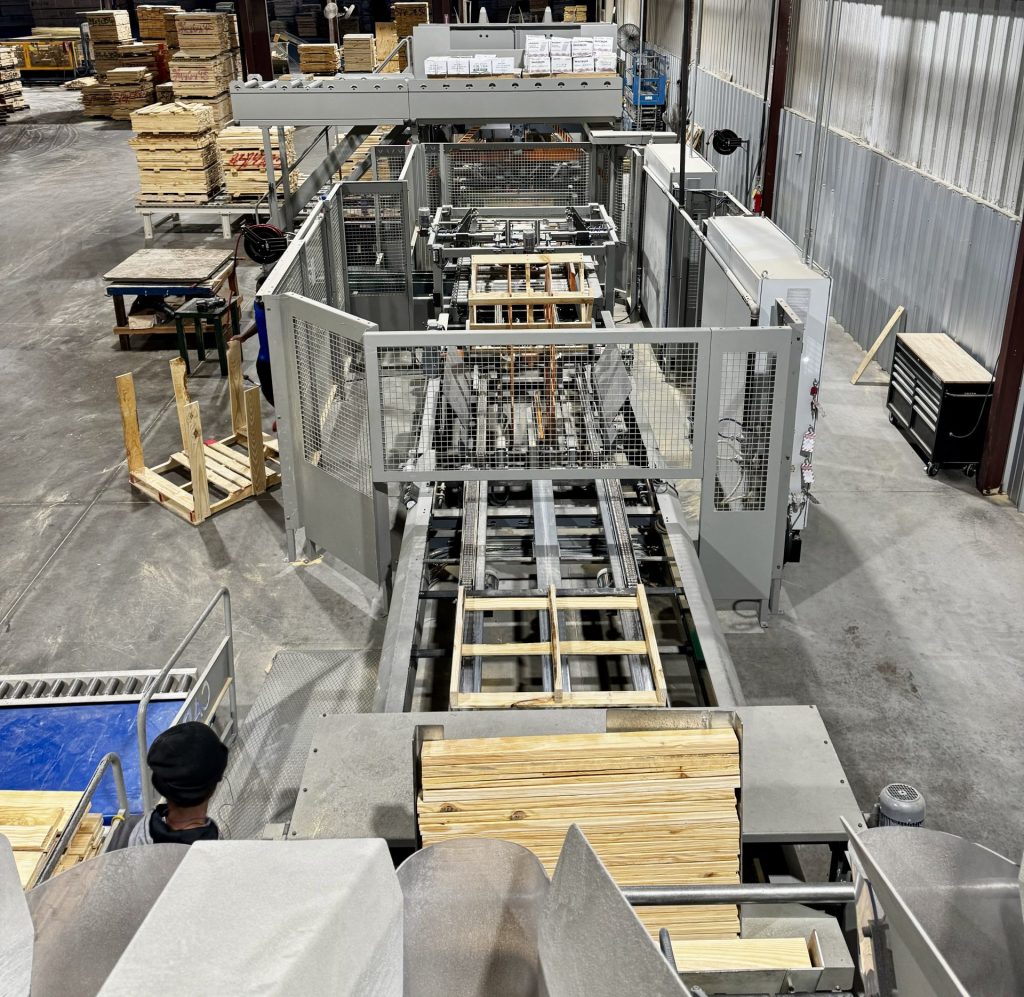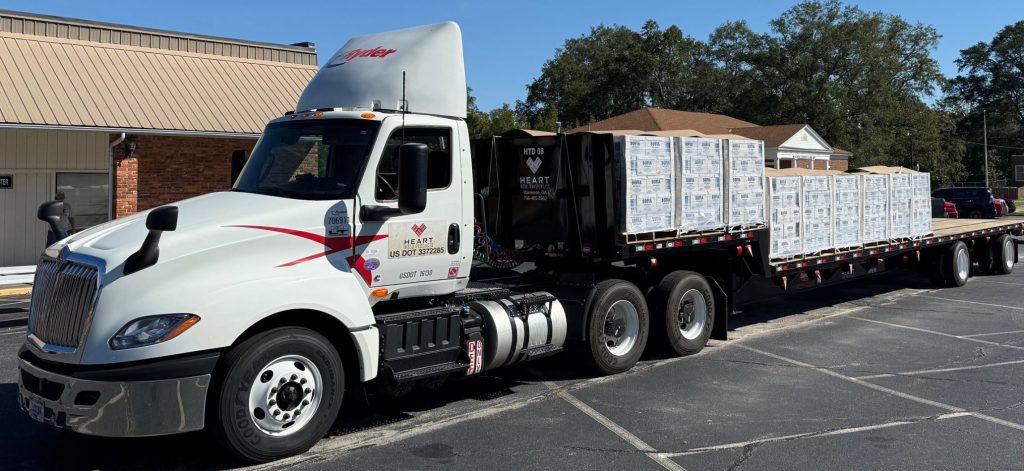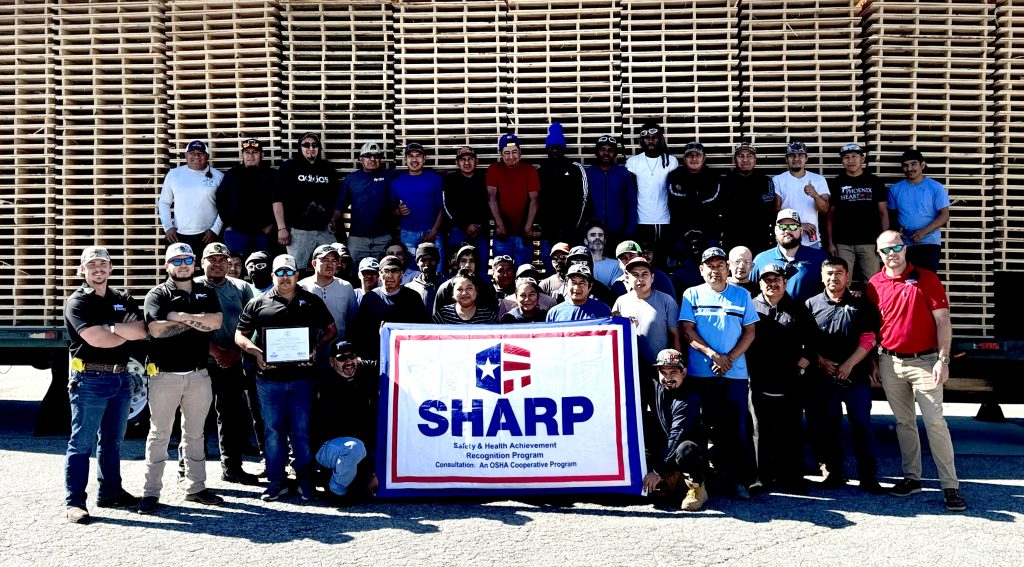ASHBURN, Georgia – It all started with a conversation. Three or four years ago, Cory McGee, chief operating officer of Ocala, Florida-based Phoenix Wood Products, was discussing some custom stacker requirements with Jeff Williams, president of PRS Group, when the topic switched to automated nailing lines.
While McGee had long been interested in greater automation, his concern with high-speed nailing systems was their sensitivity regarding low-grade lumber. For this reason, the company has leaned on Viking Champions and Rayco Pros, which have a greater tolerance for board irregularities.
“We use No. 4 Southern Yellow Pine, which can have imperfections,” he explained. Every board has some degree of irregularity, whether wane, crook or bowing. He noted that most high-speed nailing systems employ shuttle plates that push boards in from the side. McGee suggested, “A board jam is more likely in such systems when board defects like wane are encountered.”

“We couldn’t utilize most high-speed machines because they could not run efficiently with the wood that we buy and cut,” he commented. Williams suggested that Cape might answer his nailing needs, encouraging him to visit the Cape Mach 2 at the state-of-the-art John Rock facility in Pennsylvania. (Pallet Enterprise reported on John Rock’s Mach 2 machine, the first U.S. installation in the December 2019 issue.) Unlike other solutions, the Cape uses a hopper system with a feeding mechanism that supports deck boards from below before placement, making it more tolerant of component variability.
Site Visits to Assess Opportunity for New Machinery
A best practice when considering investments in expensive machinery is to take time to see it in action at other facilities. McGee did just that, checking out John Rock’s Cape machine twice. When scrutinizing new machinery, however, one thing to remember is how comparable the situation is to your own. While the Mach 2 ran great at John Rock, McGee observed that it used consistently square-edged components coming out of the John Rock sawmills. However, that wasn’t the situation at Phoenix. With that in mind, McGee asked Williams if anyone was using the Mach 2 with more variable material.
It turned out there was a plant in Idaho running a Mach 2 with low-grade western softwood. As luck would have it, he had to visit nearby on another matter, so he swung by the plant. When he saw the Cape in production, McGee was impressed. He decided to order one for the Ashburn facility, and then a month later, he ordered a second Mach 2 machine for Heart Wood Products in Warrenton, Georgia.
By way of background, Phoenix Wood Products, founded in 1992, operates plants in Ocala, Florida, and Ashburn. Heart Wood Products, jointly owned by Phoenix and Heart Wood’s managing partner, Josh Stephens, is about 150 miles northeast of the Ashburn location. Phoenix owners include Steven and Stan Redrick, along with John Fitzpatrick. (Pallet Enterprise featured Phoenix Wood Products in October 2020 and April 2019 issues.)
Installation and Getting Up to Speed
When purchasing a new nailing system, several important considerations must be made, including how it will physically fit within the facility, impact material flows, and the learning curve required to ramp up to full production.
In Ashburn, the purchase of the Cape coincided with a building expansion, so there was readily available space. At Heart Wood, more creativity was required. The necessary space was found by removing one of the Rayco Pros, which was shipped to the Ocala plant.
The Cape machines arrived in containers from Europe. A crew from PRS Group was sent to assemble them, unloading the components over two days and then beginning assembly. The PRS crew performed the primary installation, and then technicians arrived from Cape to make the final adjustments and provide the technical and operator training.
As with any complicated machinery system, there was a learning curve involved. When McGee was visiting the Cape in Idaho, the plant manager warned him to be patient. He recalled the Idaho manager and admitted, “Man, you’re not going to like this machine for about three months. It’s just different. It’s going to be hard to run it, and it just takes you time to figure it out.”
“I was like, ‘Yeah, we’re pretty smart people; we’ll be alright,’ but he was right,” McGee laughed. “It actually did take about two to three months to figure it all out.”
Steven Redrick, co-owner of Phoenix Wood Products, echoed those sentiments. He said, “The CAPE nailing machine requires a manager who will own the machine and see the ramp up process through the learning stage. Cory has done a phenomenal job. Once you get through the early stages, the machine is capable of very impressive production.”
It took some time to master each situation. “If you do get a jam on the machine, there’s a certain sequence, depending on the situation,” McGee elaborated. “If you have a jam and hit the wrong button, then it’s going to be a pain. But if you hit the right button, it’s pretty simple. It is just getting used to the nuances.”

Increased Capacity Supported Other Facilities When Hurricane Helene Struck
The Mach 2’s extra capacity came to the forefront when Hurricane Helene recently struck the Southeast. Heart Wood’s electricity was knocked out, but Ashburn was able to successfully fill its orders as well as those of another pallet company that was hit by the power outage.
“Let’s put it this way,” McGee reflected on the two-shift operation. “Before the Mach 2, I was running six Champions and two Raycos, and the most pallets I had ever built in a week was 65,000 pallets. This past week, Hurricane Helene came through, and it knocked out electricity to our Heart Wood Products facility, and so Ashburn picked up the slack. Running three Champions, two Raycos, and that Cape, we built over 100,000 pallets. We were really pushing the limits, but it shows what is possible.”
Contingency planning is central to the Phoenix Wood Products approach. The Ocala, Ashburn, and Warrenton locations are all roughly within a “300-mile bubble,” which allows them to fill orders from alternative company locations if a disruption occurs, such as the recent electricity outage.
Aside from the speed of the Cape and its tolerance for wane and other defects, the Mach 2 offers different features. While designed for stringer pallet construction, an upgrade module is available to allow block pallet production. Phoenix uses the standard three-operator approach, for example, but there is the flexibility to add robotics and other automation that can reduce staffing needs. A key difference between the Cape line and other nailing equipment is using electrical power for nailing versus pneumatics. The result is a quieter system with reduced maintenance needs. “The ease and quickness of changeover on these machines is impressive,” stated McGee. “It takes longer to swap wood out, than to complete the entire changeover on the machine.”
Redrick said, “European technology is pretty bad ass. The CAPE systems are ergonomic and make life easier for the operator when it comes to straining and bending over.”
Material Movement in the Plant and on the Road
Another thing to consider when installing new equipment is how it will change material flows. The Mach 2, for example, provides high-speed production and fast changeovers. Both factors impact the pace of how much and which material is consumed. Before the Cape, Phoenix had generally operated in a just-in-time environment, with the saws running two or three hours ahead of nailing. The challenge is different with the new machine that is hungry for lumber.
“With that Cape, I try to cut a shift ahead,” McGee explained. “What I’m cutting today is what I’m going to be using tonight. So, it is not necessarily just in time, as I used to do, because that thing is so fast, you can run out of wood very, very quickly. When you’re building three or four thousand pallets a shift on that thing, that’s a lot of lumber. The last thing I wanted to do was spend that money on a big machine, and then have it run out of wood.”
Phoenix sources SYP material from throughout the Southeast, processing it with Baker multi-trim systems and resaws to generate pallet stock. The company currently has two new Brewco 6-head multi-trim systems on order for Ashburn and Warrenton, inspired by the success of the Brewco 5-head line that has been operating at Heart Wood since 2021. “Over the last three years, it has proven to be durable, reliable, and just very well built,” noted McGee. “Based on that experience, we figured it would fit in just fine as a 6-head version of it.”
The company operates two board stackers at each facility, including Pendu bottom-up stackers and M2L machines from Max Board Feet, formerly AIT. When the company looked to have some custom stackers made a few years ago, McGee talked with a variety of suppliers and selected Pendu based on its speedy response, lead times and ability to develop customized solutions. As a result, Phoenix Wood Products bought three Pendu stackers.
McGee commented, “The Pendu stackers are very easy to operate, setup, and maintain. Pendu has really done a great job at making a reliable machine that is very user friendly.” Each facility has a 24,000-square-foot storage shed for lumber and finished products.
In 2010, Phoenix Wood Products decided to enhance customer and supplier relationships by launching a corporate trucking fleet, which now encompasses 20 power units. Having control over trucking operations has allowed the company to enhance both customer and supplier relationships. For customers, Phoenix can ensure a better delivery experience. “When we say we are going to be there, we get it there,” he stated. “When I’m relying on outside carriers, I can’t control when that truck delivers to my customer.”
Phoenix can also help mills by responding more promptly when loads are ready to ship. When a mill calls, they can dispatch a truck to get the wood sooner rather than later, allowing the mill to quickly free up space. Attention to respectful relationships on the customer and supply side, as well as internally with employees, is central to the company’s approach.

Safety First Culture
Phoenix Wood Products seeks to develop a safe workplace by focusing on training, monitoring and preventative safety measures. The company’s Ashburn facility was just recertified in the OSHA Safety and Health Achievement and Recognition Programs (SHARP) program. “I am really proud of our team and Cory’s leadership to achieve the SHARP status for 17 years running, something that is a rare achievement no matter the industry,” recognized Redrick.
SHARP is designed for small and mid-size employers that have established, implemented and maintained exceptional workplace safety standards. Notable benefits include: the reduction of operating costs, along with increased quality and productivity due to employee involvement, FREE professional safety and health mentoring, reduced OSH compliance inspections, lower workers’ compensation costs and well-deserved community recognition.
Achieving this status doesn’t come easy. McGee explained, “For our Ashburn facility, it involves a focus on training, proper establishments of systems and safety guards for new equipment deployment as well as constant monitoring of noise levels, combustible dust accumulation and more.”
Focus on Service and Relationships
Phoenix Wood Products is highly customer-centric but is ever mindful that excellence is integrally connected to other critical relationships—such as those with suppliers and employees alike. The philosophy centers on quality, integrity and service. “When we tell you we’re going to do something, from pallet spec to the delivery service, from our door to theirs, we do it with quality, integrity, and service,” McGee said.
“But hopefully that starts with the way we treat our employees,” he commented. “You treat everybody like a human being.”
“I would say we are very much a servant leadership organization,” he concluded. “I look at my job as the COO of this organization as serving my managers and giving them everything they need and all their facilities to do their jobs effectively. And I expect them to do the same thing for their employees and all the way down. That’s the same approach we take for our customers—we’re here to serve.”
“Just as we serve our customers, suppliers and employees, we serve each of the communities our plants are in,” said McGee. “Building stronger communities, builds a stronger workforce.”
Phoenix Wood Products serves customers from locations in Ocala, Florida, and Ashburn, Georgia, as well as through its Heart Wood Products partnership in Warrenton, Georgia. To find out more, visit www.phoenixwood.com and www.heartwoodpallets.com.




